13 Best Herbal Teas For Burping
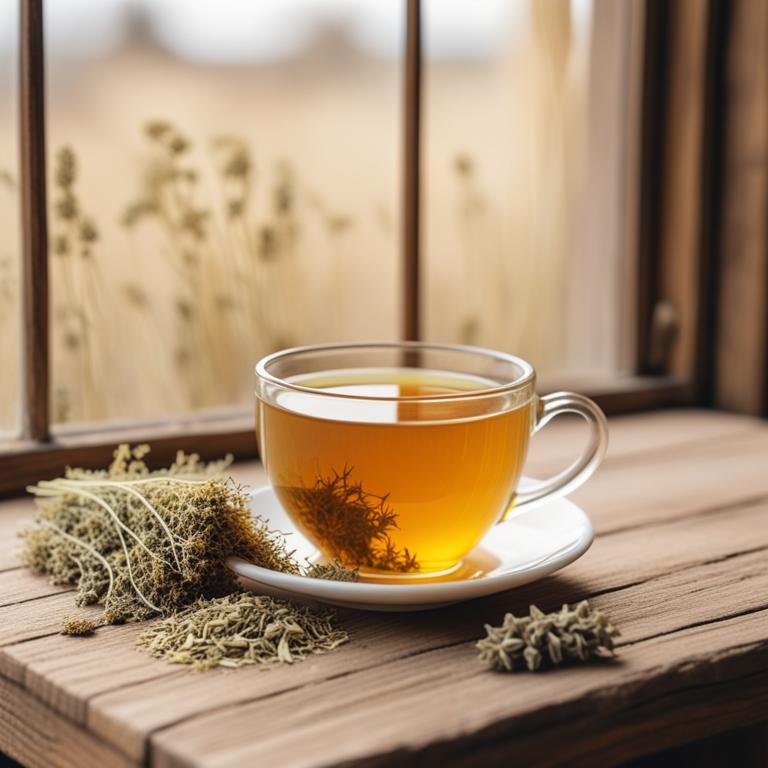
Herbal teas for Burping are a natural remedy that involves consuming tea made from various herbs and plants to alleviate and prevent burping, also known as belching.
These teas offer numerous benefits, including soothing the digestive system, reducing gas and bloating, and promoting healthy digestion.
Examples of herbal teas used to treat burping include peppermint tea, which relaxes the muscles in the esophagus and reduces belching, ginger tea, which helps to digest food and reduce inflammation, chamomile tea, which calms the digestive system and reduces anxiety, and fennel tea, which eases bloating and gas.
Additionally, other herbal teas such as dill tea, lemongrass tea, and cardamom tea are also used to treat burping due to their carminative properties, which help to release trapped gas and reduce discomfort.
According to the information in the study, teas for burping, specifically those containing Siho-sogan-san (SHS), may help alleviate symptoms of functional dyspepsia (FD) such as belching by promoting the secretion of motilin, a hormone that regulates gut movement.
Below there's a list of the 13 best herbal teas for burping.
- 1. Zingiber officinale teas
- 2. Elettaria cardamomum teas
- 3. Cinnamomum verum teas
- 4. Foeniculum vulgare teas
- 5. Mentha x piperita teas
- 6. Glycyrrhiza glabra teas
- 7. Zanthoxylum bungeanum teas
- 8. Ammi visnaga teas
- 9. Pimpinella anisum teas
- 10. Piper cubeba teas
- 11. Curcuma zedoaria teas
- 12. Cuminum cyminum teas
- 13. Anethum graveolens teas
Also you may be interested in...
TODAY'S FREE BOUNDLE
Herb Drying Checklist + Herbal Tea Shopping List + Medicinal Herbs Flashcards
Enter you best email address below to receive this bundle (3 product valued $19.95) for FREE + exclusive access to The Aphotecary Letter.
$19.95 -> $0.00
1. Zingiber officinale teas

Zingiber officinale teas, also known as ginger tea, have been traditionally used to treat the burping ailment due to its carminative properties, which help to alleviate gas and indigestion.
The bioactive constituents present in ginger tea, including gingerols and shogaols, have anti-inflammatory and antispasmodic effects that help to calm the digestive system and reduce the occurrence of burping.
By reducing inflammation and relaxing the muscles in the digestive tract, ginger tea helps to alleviate symptoms of burping, providing relief to those who suffer from this ailment.
The benefits of using ginger tea to treat burping include its ease of preparation, affordability, and the absence of harsh side effects, making it a popular natural remedy for digestive issues.
2. Elettaria cardamomum teas
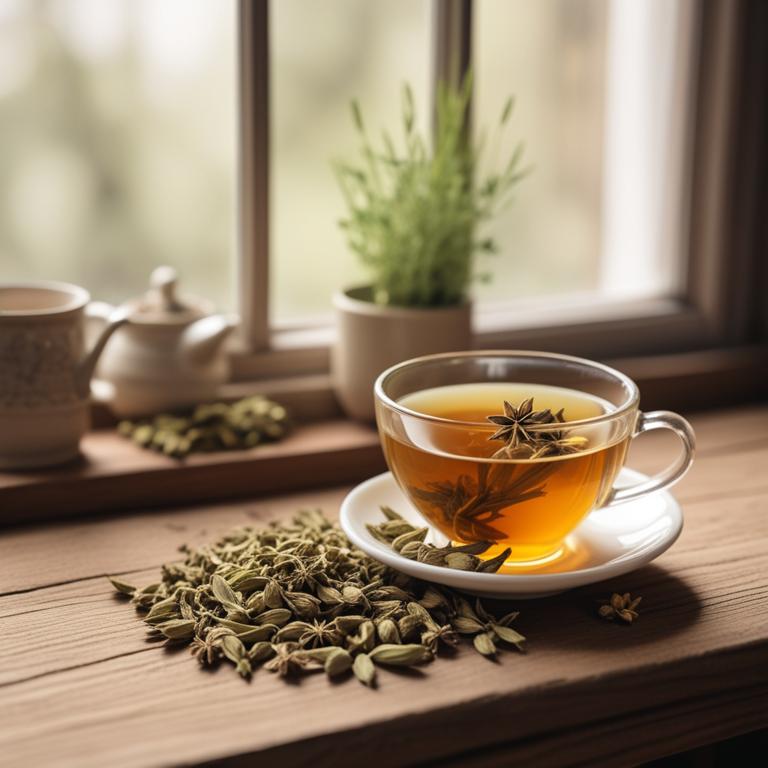
Elettaria cardamomum teas, derived from the seeds of the cardamom plant, have been traditionally used to treat the burping ailment, also known as flatulence.
The herbal preparation's carminative and anti-inflammatory properties help to alleviate this condition by reducing the production of gas in the digestive system and soothing the stomach lining.
The bioactive constituents present in cardamom teas, including limonene and 1,8-cineole, have been found to possess anti-flatulent and anti-spasmodic properties, which aid in calming the digestive system and preventing excessive gas production.
By consuming Elettaria cardamomum teas, individuals can experience relief from the discomfort of burping and enjoy the benefits of improved digestion and reduced bloating.
3. Cinnamomum verum teas

Cinnamomum verum teas have been traditionally used to treat the burping ailment, also known as belching, due to its carminative and anti-inflammatory properties.
The herbal preparation helps to treat this ailment by reducing gas formation and soothing the digestive system, thereby providing quick relief from discomfort and pain.
The bioactive constituents of Cinnamomum verum teas, including cinnamaldehyde and eugenol, have been found to have anti-inflammatory and antioxidant properties that help to calm the digestive system and reduce inflammation in the stomach.
The benefits of using Cinnamomum verum teas to treat burping include natural relief from discomfort, reduced risk of digestive disorders, and a soothing effect on the digestive system.
4. Foeniculum vulgare teas

Foeniculum vulgare teas, also known as fennel tea, have been traditionally used to treat the burping ailment due to their carminative and antispasmodic properties.
These properties help to relieve gas and bloating, reducing the frequency and severity of belching.
The bioactive constituents of fennel tea, including anethole and volatile oils, help to relax the muscles in the digestive tract, reducing spasms and allowing gas to be released more efficiently.
Regular consumption of fennel tea has been shown to provide relief from belching and other digestive issues, making it a popular natural remedy for this common ailment.
Related Study
According to the study, Foeniculum vulgare teas for burping, which is derived from the oil emulsion of fennel seed, have been shown to reduce intestinal spasms and increase motility of the small intestine, indicating potential effectiveness in alleviating symptoms associated with infantile colic.
5. Mentha x piperita teas

Mentha x piperita teas, also known as peppermint teas, have been traditionally used to treat the burping ailment due to their carminative properties, which help to reduce gas and alleviate discomfort.
The bioactive constituents of peppermint teas, including menthol and menthone, have been shown to help relax the muscles in the digestive tract and improve digestion, thus reducing the likelihood of burping.
The menthol in peppermint teas also has a soothing effect on the stomach and esophagus, helping to calm digestive issues and relieve symptoms of burping.
The benefits of using peppermint teas to treat burping include improved digestion, reduced gas and bloating, and a sense of relief from discomfort, making it a popular natural remedy for this common ailment.
Related Study
According to "BMC veterinary research", Mentha x piperita teas were found to be one of the most promising candidates for gastrointestinal diseases, potentially helping to alleviate symptoms such as burping in calves and piglets.
6. Glycyrrhiza glabra teas

Glycyrrhiza glabra teas, derived from the root of the licorice plant, are a natural remedy used to treat burping and other digestive issues.
The anti-inflammatory and carminative properties of this herbal preparation help to alleviate discomfort and reduce the frequency of burping, promoting a sense of relief and well-being.
The bioactive constituents, such as glycyrrhizin and flavonoids, have been found to reduce inflammation in the digestive tract and relax the muscles in the stomach, thereby easing symptoms of burping.
The benefits of using Glycyrrhiza glabra teas to treat burping include improved digestion, reduced stomach discomfort, and a decrease in the occurrence of acid reflux.
Related Study
According to "Journal of the Medical Association of Thailand = Chotmaihet thangphaet", Glycyrrhiza glabra teas may help reduce burping due to its antimicrobial properties, specifically showing strong activity against S. pyogenes, S. pneumoniae, and S. mutans, which are bacteria that cause acute pharyngitis.
7. Zanthoxylum bungeanum teas
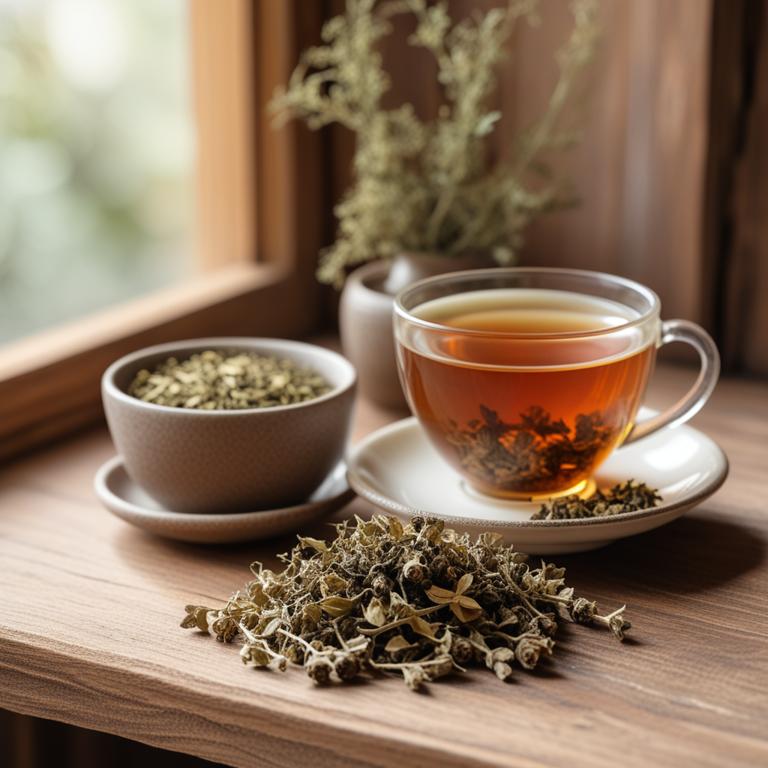
Zanthoxylum bungeanum teas have been traditionally used to treat the burping ailment, also known as belching or eructation, due to their carminative and anti-spasmodic properties.
The bioactive constituents of this herbal preparation, including volatile oils, flavonoids, and alkaloids, help to treat this ailment by relaxing the diaphragm and reducing the frequency and severity of belching.
By soothing the stomach and digestive tract, Zanthoxylum bungeanum teas help to alleviate the symptoms of burping and promote overall digestive health.
The benefits of using this herbal preparation to treat the burping ailment include improved digestion, reduced discomfort, and a more balanced gut microbiome.
8. Ammi visnaga teas

Ammi visnaga teas have been traditionally used to treat the burping ailment, also known as belching or flatulence, due to its carminative properties that help to alleviate digestive discomfort.
The herbal preparation's ability to ease bloating and gas formation is attributed to its bioactive constituents, including coumarins and furanocoumarins, which have anti-inflammatory and antispasmodic effects.
By reducing inflammation in the digestive tract and relaxing the muscles, ammi visnaga teas help to treat burping by preventing the release of trapped gas and promoting a smoother digestion process.
The benefits of using ammi visnaga teas to treat burping include improved digestion, reduced discomfort, and a decrease in episodes of excessive belching.
9. Pimpinella anisum teas

Pimpinella anisum teas, also known as anise tea, have been traditionally used to treat the burping ailment due to their carminative and anti-inflammatory properties.
The bioactive constituents present in this herbal preparation, such as anethole and limonene, help to break down and expel gas from the digestive system, thereby reducing the occurrence of burping.
By soothing the digestive tract and reducing inflammation, Pimpinella anisum teas help to alleviate symptoms of burping, including discomfort and embarrassment.
The benefits of using Pimpinella anisum teas to treat burping include a natural and non-invasive approach to symptom relief, with minimal side effects and no risk of addiction or dependency.
10. Piper cubeba teas

Piper cubeba teas have been used for centuries to treat the burping ailment due to its carminative and antispasmodic properties, which help to alleviate digestive discomfort and reduce the frequency of belching.
The bioactive constituents of Piper cubeba, including piperic acid and piperonal, work together to relax the muscles in the digestive tract and reduce inflammation, thereby providing relief from burping.
By reducing gas formation and alleviating digestive discomfort, Piper cubeba teas help to treat the burping ailment, promoting a sense of calm and well-being.
The benefits of using Piper cubeba teas to treat burping include improved digestion, reduced discomfort, and a natural approach to managing digestive issues.
11. Curcuma zedoaria teas

Curcuma zedoaria teas have been used traditionally to treat the burping ailment, known as belching or flatulence, due to their carminative properties which help to relieve gas and reduce discomfort.
The herbal preparation contains bioactive constituents such as curcumin, demethoxycurcumin, and bisdemethoxycurcumin, which have anti-inflammatory and antioxidant properties that help to soothe the digestive system and reduce inflammation in the stomach and intestines.
By reducing inflammation and promoting digestion, Curcuma zedoaria teas help to alleviate the symptoms of belching, such as bloating, discomfort, and abdominal pain.
Regular consumption of Curcuma zedoaria teas can provide long-term benefits in terms of digestive health and overall well-being, making it a popular natural remedy for treating burping and other digestive issues.
Related Study
According to "Journal of ethnopharmacology", Curcuma zedoaria teas for burping may have carminative effects, as part of the main indications of medicinal plants traditionally used for gastrointestinal disorders.
12. Cuminum cyminum teas
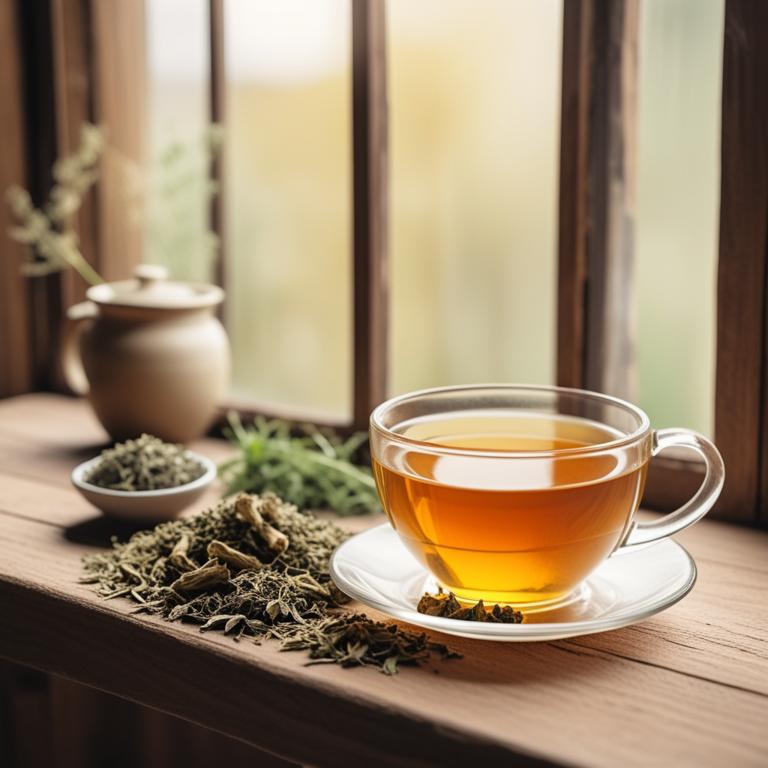
Cuminum cyminum teas, derived from the seeds of the cumin plant, have been traditionally used to treat the burping ailment, also known as belching.
The herbal preparation's properties, including its carminative and digestive-stimulating effects, help to alleviate this condition by reducing gas formation and promoting the digestion of food.
The bioactive constituents, such as limonene and cuminol, present in Cuminum cyminum teas, are responsible for its medicinal properties, which help to treat burping by regulating the movement of food through the digestive system and reducing the formation of gas.
The benefits of using Cuminum cyminum teas to treat burping include its ability to provide quick relief, its natural and non-invasive nature, and its potential to prevent future episodes of belching.
13. Anethum graveolens teas
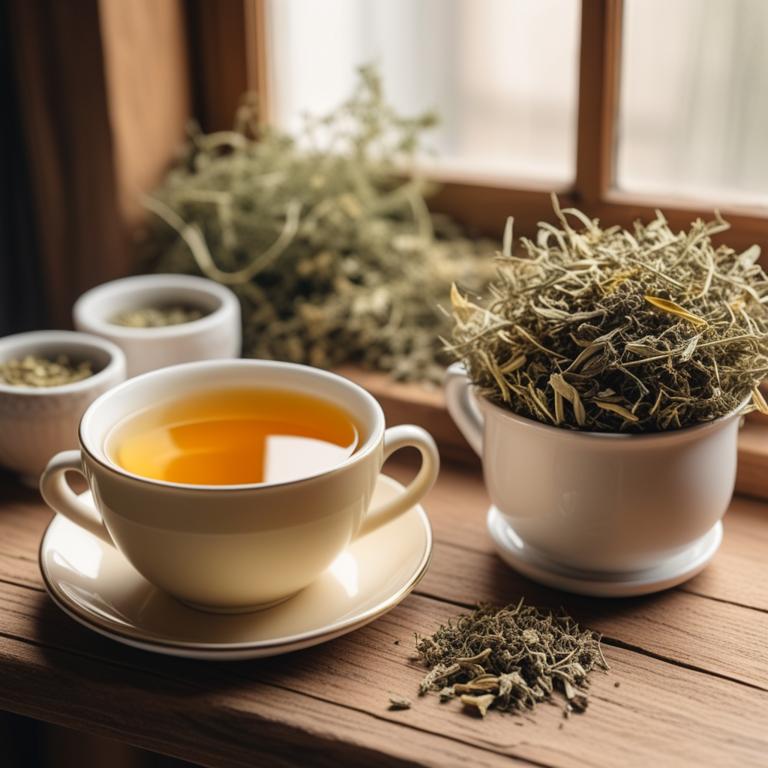
Anethum graveolens teas, also known as dill teas, have been used for centuries to treat the burping ailment due to their carminative and anti-inflammatory properties.
The bioactive constituents present in dill teas, such as dill apiole, dill ether, and limonene, help to reduce gas formation and alleviate discomfort associated with burping.
By reducing the production of gas and soothing the digestive system, dill teas provide relief from the symptoms of burping and promote overall digestive health.
The benefits of using dill teas to treat burping include reduced bloating, improved digestion, and a decrease in the frequency and severity of burping episodes.